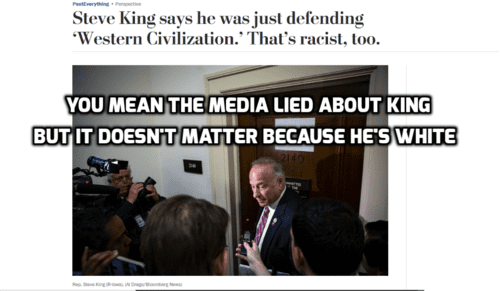


01/16/2019
From the Washington Post opinion section:
Steve King says he was just defending ‘Western Civilization.’ That’s racist, too.
By David Perry and Matthew Gabriele, January 15 at 4:45 PM
After years of making racist statements and promoting racist policies, Rep. Steve King (R-Iowa) may finally have gone too far. In a recent interview, he told the New York Times, “White nationalist, white supremacist, Western civilization — how did that language become offensive? Why did I sit in classes teaching me about the merits of our history and our civilization?”
King says, plausibly, that he was libeled via mispunctuation. He says the dash should come before “Western civilization:” he was complaining that “Western civilization” is now treated as same as “White nationalist, white supremacist.”
The Washington Post authors explain that, yes, they are calling “Western civilization” “white nationalist, white supremacist.”
King’s GOP colleagues have stripped him of his committee assignments, and he faces possible censure. In response, the congressman claims that he was misrepresented — that his fellow Republicans and other observers did not understand his syntax. In a statement, he said he was not defending white supremacy or white nationalism but only “Western Civilization” from those who say the term has become “offensive.”
Given that King has frequently used “Western civilization” as a shorthand for whiteness, his defense is hardly credible, but the attempt is revealing. The term has been used to justify racism since it was coined. When King says, “No one ever sat in a class listening to the merits of white nationalism and white supremacy,” he’s conveniently overlooking this fact — and relying on the similar reluctance of many academics to acknowledge it. That needs to change.
Part of the project of modernity has been to justify itself. During and after the Enlightenment of the 17th and 18th centuries, citizens of the monarchical European powers attempted to explain how they got to where they were by looking to their roots. They started from the idea that their world was “better” than what had come before. Europe had supposedly crawled out of the “Dark Ages” and into the light. Those familiar terms — dark and light — mirrored the value judgment behind this investigation of the past, one that selectively privileged white skin.
Uh … the term Dark Ages was applied to the Barbarian Invasions carried out by Teutonics into the southern Mediterranean.
These were, after all, countries ruled by rich white men for other rich white men. So in searching for the history of “the West,” they ignored stories they didn’t recognize — stories of people who didn’t act, think or look like them. That was true even when those stories were central to European and Mediterranean history, as was the case with a history of “the West” told in other languages such as Arabic, Turkish and Hebrew; written by women; or enacted by medieval people of color.
Just watch the BBC’s Troy: Fall of a City to find out that Achilles was black:
Although the histories of Europe began as national ones, thinkers in the 18th and 19th centuries looked to 4th-century Germanic tribes as their pure, white ancestors. In alliance with the “scientific” study of the past, scientific racism, the international slave trade and colonialism, this approach began to change the way people understood the past. No longer individual nations — and also no longer simply “Europe” because of the need to include North America — these thinkers used the term “the West” to encompass one (supposedly) common heritage that explained why white men ought to rule the world. …
… Since the late 20th century, however, that premise has been challenged as scholars have begun to incorporate other stories into the tapestry of history. We talk about the role of women, about what gender meant at different moments in the past, about the construction of race as an idea, about the diversity of Europe’s peoples. The research in these areas is original and convincing. …